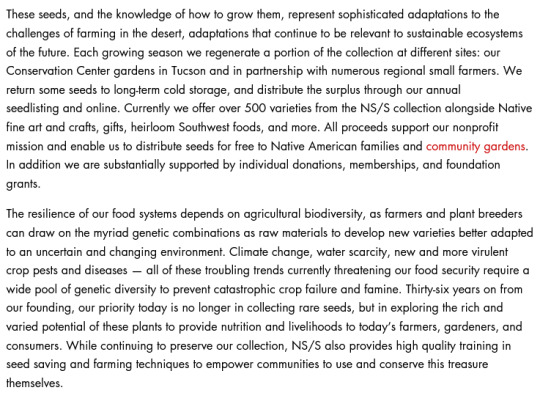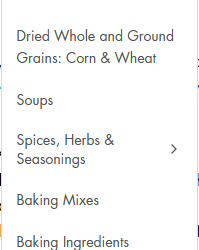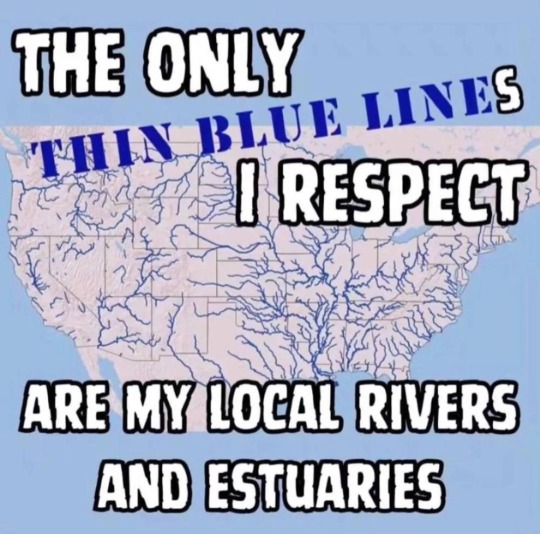he/they, often bored, far left. Collectivism and autonomy are not mutually exclusive.
Don't wanna be here? Send us removal request.
Text
Incredible how Americans are so brainwashed by capitalist realism that a large contingent out our leftists genuinely believe government regulation isn’t physically possible.
23K notes
·
View notes
Text
so I found this really cool website that sells native seeds- and you might be asking me "snekdood, haven't you posted an entire list of websites that sell native wildflower seeds that you're going to add on to soon?" and yes that's true, but that's not the kind of native seed im talking about rn.
see, on my quest to find websites that sell native wildflowers, I came across this dope ass website that sells seeds that have been farmed and harvested by ntv people traditionally, i'll let the website do the talking:




so anyways this is the coolest website ever. you can find the wild relatives of chiles on here called chiltepines, you can find different colors of corn and cool squash's, and every seed from whichever farm has it's own lil origin story written about it. you can also find other veggies here that are already commercially available to help fund and support this organization. as well as there being a cool gift shop with a lot of art made by different native folk from all around as well as cookbooks, jewelry, pottery, weavings, and clearly plenty more:

as well as a pantry?? with premade soup mixes??? and i really want to try them now??????

anyways I think its worth snoopin' around bc I'm almost positive you'll see something you think is cool (oh also if you happen to have some seeds passed down from ur family too and ur also native they seem like they would gladly help produce more)
4K notes
·
View notes
Video
“They took our land, they imprisoned our queen, they banned our language, they forcibly made us a colony of the United States. America says they are democratic, that is a lie! They have never been democratic with Native people! They have never been democratic with Indians! They have never been democratic with Hawaiians!”
74K notes
·
View notes
Text
Leave the leaves! Raking is violence
For late rakers, here's a reminder that leaf litter:
is a protective and insulated home to many animals, cocoons, and eggs that will emerge in spring
is an insulted layer over the earth and the animals (like many bee species) that burrow underground for winter
is home to a lot of mold spores that stay trapped in the leaves until they're raked and disturbed and end up filling the air, causing discomfort and even posing a danger to people with mold allergies
provides a slow and steady supply of nutrients to the soil and plants, making all the plants that grow in the area (trees, grass, flowers, etc) stronger and healthier the following year
So if you're still on the fence, leave those leaves alone! And if you're arguing with someone else about, such as a parent or HOA member, choose the right argument; people who care more about how their grass looks won't be swayed much by arguments about protecting butterfly and moth cocoons.
1K notes
·
View notes
Text
you think you’re normal until you casually say something like “I think the deep forests are underutilized as a new third space and should be advertised as such. the era of the mall is over now is the era of old growth” and get nothing but blank stares
97 notes
·
View notes
Text
I mean it simply offers greater total uncrusted perimeter. Guys the sandwich math is not that hard to figure out

12K notes
·
View notes
Text
If my stuff is passing your dash at all and you haven’t already read Braiding Sweetgrass, you should probably go rectify that condition as quickly as possible. My friends complain about how annoying I can be out recommend books to, because of how high i set my expectations (books are slow, if you need that much time the payout needs to be there). Braiding Sweetgrass I pause to describe. Locating gets tossed around a whole lot, but this book earns it. It’s beautiful, informative, and insightful in ways very few works manage to be. The philosophy it presents is quite radical while fitting snugly into tradition and science. It refreshes love and curiosity for the world that can be easily lost while pursuing academic learning about it. Everybody go read the book, get Robin paid.

359 notes
·
View notes
Text
This is a great list, lots of inspirations and aspirations to steal here. I also live where i can’t have a normal compost setup, but i have a small vermicomposting box in one of my closets, i highly recommend the process as it’s a great way to get rid of vegetable scraps as well as some of your paper waste.
There are setups you can buy online, but i just had two plastic storage bins, one nested in the other, with a few holes near the bottom of the inside box. Put a few alternating layers of soil and newspaper or similar down, introduce worms (i bought red wiggles online, that’s a pretty typical species for this job), and give the worms a few weeks to settle in. After that, add your scraps every so often as to avoid a smelly kitchen but also disturb the worms as infrequently as possible. You can freeze scraps to bulk up and bother the worms lies often but make sure to thaw them thoroughly or risk hurting your new pets. Eventually your scraps will become casings, and you’ll have some leachate pooling up in the bottom of the outside box. The casings are great to mix into soil when potting or planting darn near anything. The leachate can be added to water to fertilize any plants you have around, my houseplants thrive off of it.
The boxes don’t really smell, there is a bit of a damp, maybe organic odor, but it isn’t unpleasant. Like in most living systems, foul smells are usually a sign of something going wrong. If you encounter a foul smell you should check on your worms and compare the remaining scraps to what they’ve been given and see if you can find and remove the source of the rot, then check online for compatibility with the foods given and the worms.
Living lighter
I've been consciously trying to figure out ways to leave less of an imprint on the earth... here are a few things that I've implemented:
Reducing plastic use:
Water delivery in glass jars (spring water AND no plastic!)
Laundry pods instead of plastic containers
Refillable deodorant
Reusable jars for when I go to the herb store
I buy compostable garbage bags and reuse the produce ones for daily trash (would like to eliminate those though)
Reducing paper waste:
Using towels instead of paper towels and napkins
Using canvas totes when grocery shopping
Shopping local:
I stopped shopping at huge corporate owned grocery stores like Whole Foods and shop at my local neighborhood places
Curbed my Amazon addiction (still definitely use it, but try my best to reduce as much as possible)
Diet:
Eating mostly plant based (but some wings and fish here and there)
Things that weren't so great that were reusable:
Menstruation cup (super messy and not for me)
Q-tips (I bought this off a kickstarter and didn't feel like it was cleaning anything)
If I owned my own place, things I'd implement:
Bidet (use way less toilet paper and everything is so much cleaner)
Solar panels
Ways to reuse gray water
Compost (you'd think LA apartments would have this but nope)
It might not seem like much listed out, but it does make me feel better that I'm actively trying to reduce my imprint. If everyone did something small, it'd add up to something big! A book that I just finished, Braiding Sweet Grass, really made me think about our relationship with the Earth and how we can make it more reciprocal.
I'm always looking for more ways to improve, so if anyone has any suggestions, would love to learn!
96 notes
·
View notes
Text
So I’m an environmental consultant. A good portion of my job is looking through scans of old records to determine how likely it is that some property has been contaminated by human use. Old street directory images and fire insurance maps are some of our most useful documents, but are often quite difficult to read, and our pdf reader can’t detect, and therefore search, the text. This original use would be so helpful for me, if OCR were good enough to actually recognize the addresses on the older directories, I would be in heaven. But no, instead Google buys Captcha and we get automated plagiarism. Awesome.

41K notes
·
View notes
Text
Spread the word. They’re the same word
This may be controversial but I think we should just agree to use Moth and Butterfly as interchangeable terms
56 notes
·
View notes
Text
Life is getting harder, and so, we must get better at it.
Climate change and species extinction and ecosystem collapse are happening quickly. They are spiraling out of control. Even many Ecosystems that are supposed to be the most stable in their regions are facing decline. There are runaway effects, each thing that gets worse makes the next thing get worse faster, more disastrously. Each of these systems becomes less resilient the more of its redundancies are stripped away.
And yet, we can also have cascading effects. I am seeing controlled burns turn the plantation pines into savannas again, for the first time in 200 years, they are burning now, right now, where they would never have imagined to burn a year ago. I am seeing people talk about planting native plants. The nurseries here are selling out of them faster than they can restock. If you ask, they will say “This did not happen last year”. The foundations that have been being built by ecologists over the past half century, and maintained against brutal colonialism by indigenous peoples, are seeping out into the community. I see people talking about river cane, and pitcher plant, and planting paw paw and persimmon and sassafras and spice bush. These things are returning. Even now in, the worst drought in known history of my area, I see more butterflies than last year, because we have put in more of their host plants, their overwinters. We are learning. We are beginning. We are being born into a world of ecology; we are breaking the green wall of blur that defines our settler nonrelationship with nature. The irises are returning to Louisiana, the black bear too. The oysters are returning to Mobile Bay. I hear talk of gopher apples and river oats from the mouths of children. I see the return of the chinquapin, and her larger sister chestnut. It is slow but it is also so fast. It is growing at new trajectories, new rises. Each of these becomes it’s own advocate when planted in space and put in relationship.
We are not doomed. We must claw back from the brink. We must find each other and we must exchange seeds. We must learn to pull invasive species. We must win others over through earnestness and full bellies, through kindling the spark of ecological joy, and then we must show them the way. We must be learning the way ourselves in the meantime. We must teach the children the names we were not told, that were forgotten; how to recognize these friends.
When things are spiraling towards despair and death we must be that spiral towards life and utter utopia. We must build ourselves into full participants in our ecological systems.
As life gets harder, we must get better at it.
1K notes
·
View notes
Text
It’s always funny when liberals who don’t participate in or organize actions feel their opinion on what tactics those actions use is warranted or useful. You have such a great idea for how to organize against violence, oppression and exploitation? Then you go do it. Oh you don’t know how to and have no interest in learning or trying? How convenient!
If you’ve never participated in even civil disobedience your opinions on protesting are less than dogshit. You are nowhere near an expert in this field at all so you shouldn’t be doling out advice or making demands on protest etiquette and tactics. You are the equalivant of a five year old attempting to lecture a university laboratory on how to manage a research project. Either join the field, learn its history and methods, or shut up.
135 notes
·
View notes




